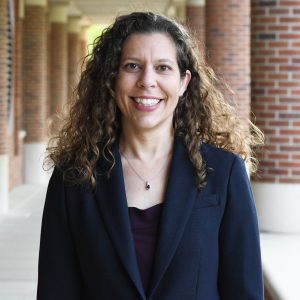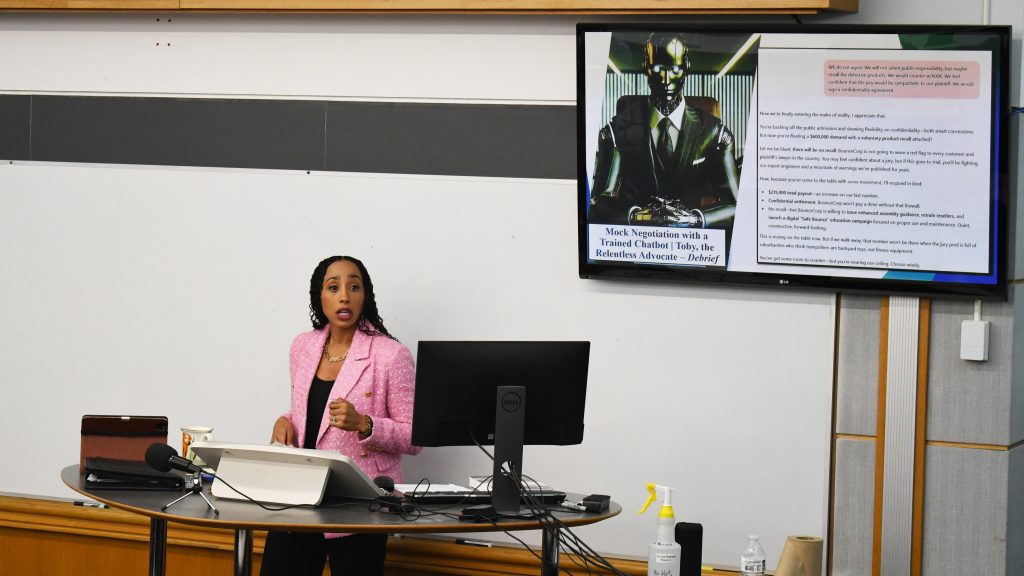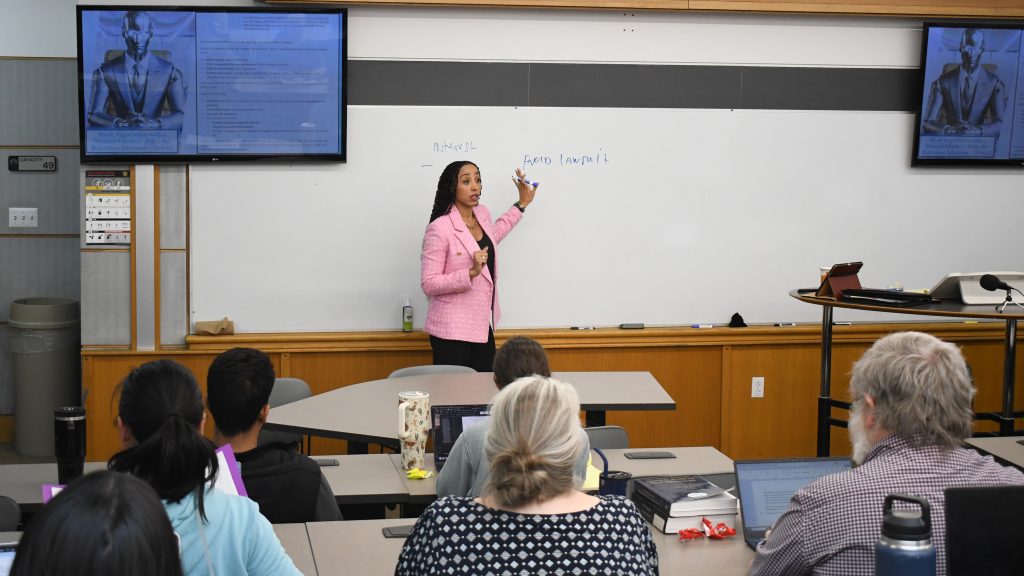Published on

by Tanner O’Neal Riley
Artificial intelligence is changing the world faster than most professions can keep up. At the University of Missouri School of Law, however, it’s not an afterthought — it’s a foundation.
As part of a pioneering group of law schools integrating AI into legal education, the University of Missouri and Mizzou Law are positioned as an “AI-forward institution.” From chatbot tutors to negotiation simulations powered by large language models, the technology transforming the legal industry is also transforming how Mizzou Law students learn.
The goal: give students hands-on experience with ethical and effective AI use that is seldom available elsewhere.
Building AI Tutors for Tomorrow’s Lawyers
Professor Jayne Woods, who has presented both nationally and locally on the use of AI in teaching, sees AI as an opportunity to give students a competitive edge when they enter the legal profession.
“The legal profession is inevitably headed towards using AI, because when a client is choosing between two practitioners, and one can do something in 2 hours while the other takes 10 hours, only one of them is going to have a reasonable fee,” she said.

In addition to traditional teaching methods, Woods built three “tutor bots” using custom generative pre-trained transformers, or GPTs. Each bot serves a different purpose: one is a grammar bot aimed at encouraging students to critically engage with the revision process, and the other two help students navigate a legal citation manual and learn basic legal research skills.
What started as an experiment quickly gained traction. Students found the bots helped them work more confidently and independently.
“It took me about a day to program two of the bots and significantly longer for the third, and I was originally unsure how students might use them,” Woods said. “But my students enjoy interacting with them, and the results, even this early in the semester, are tangible. These bots give them a chance to experiment with the technology in a productive way while still gaining the critical legal skills they need to succeed.”
The bots are designed not to give answers outright like ChatGPT or Claude. Instead, they guide students through reasoning, ask follow-up questions, and walk students through the necessary processes. They reinforce how to think, not what to think.
Mizzou Law’s investment in AI tools reflects a broader trend across the University of Missouri campus: using generative technology to enhance—not replace—the human experience of learning. Woods emphasized that AI is not a substitute for the professor-student relationship but an extension of it.

“AI cannot replace educators because it doesn’t understand nuance, at least not yet. And it can’t provide empathy. A lot of the things that make us human, AI just can’t do,” Woods said. “But it’s a tool that faculty can harness in the interests of our students. I can’t be everywhere with them all of the time, and office hours are only so long. But by using the bots, students can get help and guidance whenever and wherever they need it.”
Negotiation in the Age of AI
While Woods’s bots focus on tutoring and comprehension, Professor Renee Henson, a nationally renowned AI scholar, introduces AI to students within the context of negotiation.
Professor Henson’s teaching and research draw upon her background in complex business and commercial litigation, with particular emphasis on products liability and intellectual property. Her scholarship examines the evolving intersection of artificial intelligence, tort law, and insurance, with a focus on how legal frameworks respond to emerging algorithmic harms. She has written on topics such as strict products liability for AI-related injuries, the design of government-backed insurance mechanisms for AI risk, and the potential of the European Union’s AI Act as a model for U.S. regulation. Across this body of work, Professor Henson explores how law can balance technological innovation with accountability, fairness, and risk governance.
In her classes, students face off against “Toby,” a negotiation bot designed to simulate adversarial bargaining.
The bot adapts its tone and strategy based on student input, creating a dynamic and realistic training ground. This is due to the unique training data Henson provided during the programming stage, a process that she has refined since originally deploying Toby two years ago.
Negotiating with Toby is “as close to the real thing a student can get outside of actual negotiation,” Henson said. “Toby is operating by the same negotiation rules as I am teaching students in class. It’s really helpful for them to see that modeling and to see the terms, for example, that we learn in class used against them… They have raved about the bot ever since we started using it. It’s an engaging, interactive way to pull them into negotiating.”
Toby may be engaging, but negotiating against him is anything but easy. The bot has been described as “prickly, obstinate, a zealous advocate,” and “loquacious,” traits students are likely to encounter in opposing counsel.

“Students are not guaranteed to settle,” Henson said. “Students engage with Toby much as they would with a demanding opposing counsel. Notably, both students and Toby make realistic offers and concessions in reaching agreement. Through this process, students develop advocacy skills that are difficult to replicate outside of this exercise.”
Henson incorporates AI into other aspects of her teaching as well, ranging from “closed policy” approaches for certain assignments to a more open, experimental approach for her Law of AI class, planned for the spring. Her goal is not to make students dependent on AI but to make them fluent in its capabilities and limitations.
An AI-Forward Campus
Mizzou’s commitment to being an “AI-forward campus” extends beyond the law school. Across departments, faculty and students are testing ways to integrate AI responsibly — from journalism and engineering to business and education.
Dean Paul Litton emphasized that this intersection of law and technology is where Mizzou Law aims to lead. “Our faculty members discuss with students how to use generative AI responsibly and professionally, making sure they understand how to comply with the relevant professional standards. AI is already important to legal practice and its use will continue to grow in the profession. Our students need to be prepared to use it effectively and responsibly in this changing landscape.”
Classes increasingly include discussions on data privacy, algorithmic bias, and the role of human judgment in an automated world. Mizzou’s AI initiatives are guided by curiosity and caution, recognizing that what happens in the classroom today could shape how lawyers regulate AI tomorrow.
Outside academia, AI is already reshaping the legal field. Law firms are adopting AI tools to streamline research, draft documents, and predict litigation outcomes. Mizzou Law’s AI initiative is therefore more than an academic experiment — it’s a professional imperative.
Students graduating from Mizzou Law will likely enter firms or agencies already relying on AI-powered platforms. Both Henson and Woods believe that early exposure gives Mizzou Law graduates a competitive edge.

“AI is the future, and the future is being shaped here and now. Our students have tools at their disposal that were not available five years ago. Now, in the prime of their legal development, they are being prepared to practice law professionally as is standard, but with a skill set possessed by few,” Henson said.
Woods added that her tutor bots are models of what future legal assistants might look like: sophisticated, adaptive, and built to think alongside human lawyers.
“AI technology is developing rapidly and in ways previously thought impossible. Technology once used for only menial tasks is now capable of outlining briefs and breaking down cases. These systems, as advanced as they are, still need human oversight and prompting. That’s where our students come in — they are the jurists of tomorrow. With the knowledge and tools we provide, they can do more than previous generations in half the time,” Woods said.
Both professors Woods and Henson sit on the Mizzou Law AI Committee, for which Woods serves as chair, a faculty cadre dedicated to helping students and faculty engage with AI responsibly. The committee is planning a series of student workshops and hosting monthly faculty AI and teaching discussion groups led by Woods in her role as the AI Teaching Fellow.
The committee does not, at this time, share responsibilities with the University of Missouri AI Committee on which Henson serves. The standing committee, created in spring 2025, was born out of the University of Missouri AI Task Force, which produced recommendations presented to Provost Matthew Martens in June 2024 and adopted the following academic year. These recommendations included creating guidelines for AI usage on campus, as well as establishing the position of AI Teaching Fellow.
As the campus continues to embrace an “AI-forward” philosophy, one thing is clear: the lawyers of tomorrow will graduate not just knowing the law but understanding the technology shaping it.